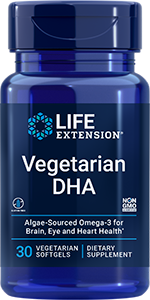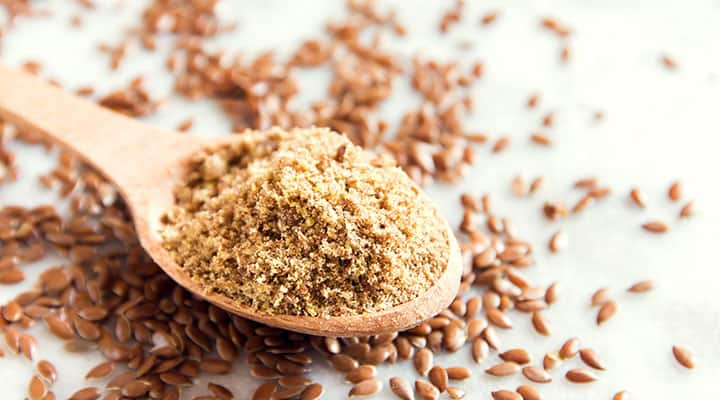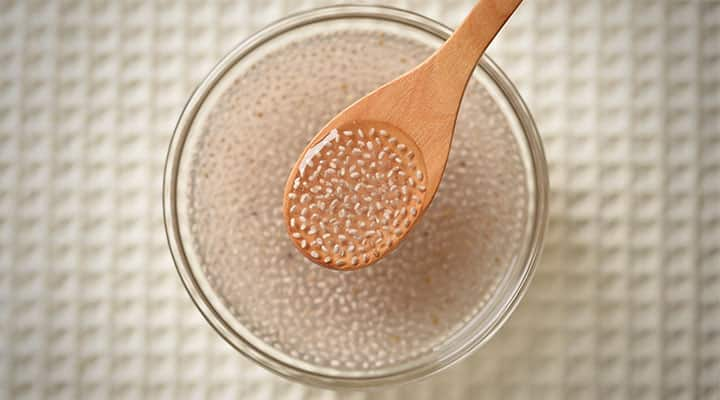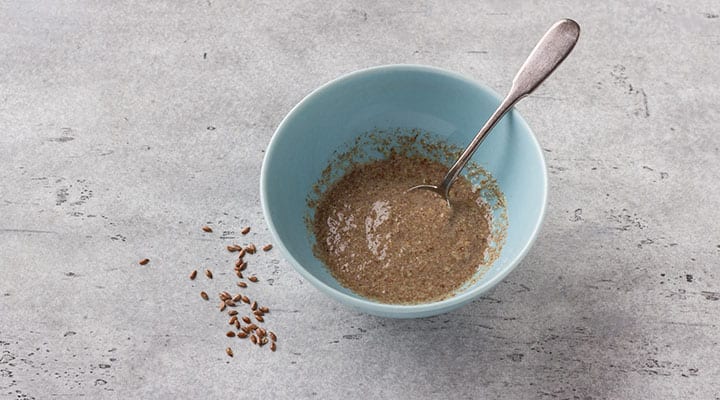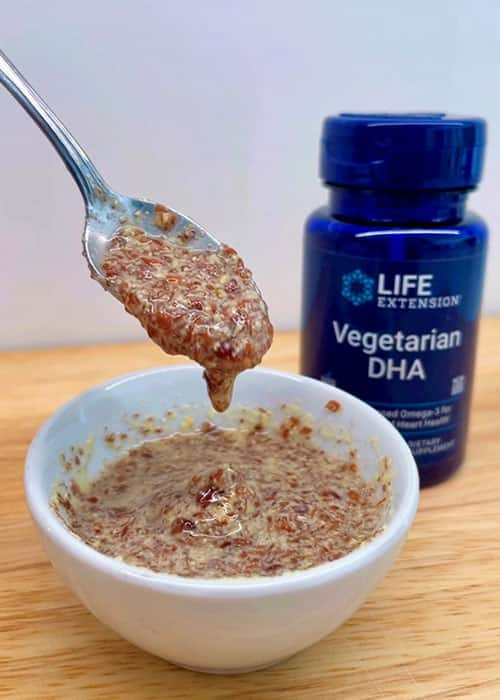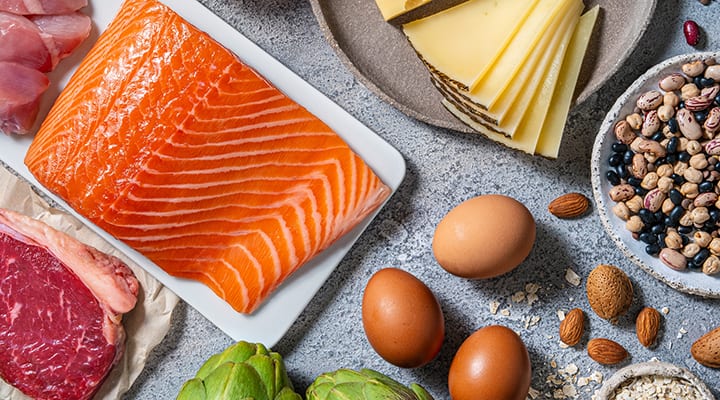
Flax Eggs: A Nutritious Egg Substitute
Published: May 2025
Egg alternatives are gaining popularity as people embrace animal-friendly diets and a willingness to experiment in the kitchen. One of the most versatile vegan egg alternatives is the flax egg, a replacement that contains omega-3 fatty acids and other beneficial nutrients.
What is a flax egg?
A flax egg is a vegan-friendly egg substitute made by mixing ground flaxseed and water. When those two elements are well-mixed and allowed to rest, they develop a gelatinous consistency that works as a binder just like eggs do. This egg replacement is not only easy to make, but versatile, inexpensive and nourishing—providing fiber, magnesium and alpha-linolenic acid (ALA)—an omega-3 fatty acid that is a precursor to the better-known DHA.
Use flax eggs for cookies, muffins, cupcakes, breads, brownies and pancakes.
What type of flaxseed is best for making flax eggs?
There are two types of flax for making flax eggs: golden flaxseed and brown flaxseed. They are both available in whole and pre-ground form, but to make the flax egg, the flaxseed must be pre-ground. Flax eggs won't set with whole flax seeds because of the shell—and your body is unable to digest whole flax seeds. To maximize its nutritional superpowers, and to create a flax egg, use ground flax. You can buy it pre-ground (flaxseed meal) or purchase it whole and grind it up in a coffee grinder or blender.
The main difference between golden and brown flaxseed is the color. Golden flaxseed results in lighter-colored baked goods, while brown flaxseed turns the batter darker. When it comes to flavor, golden flaxseed is much milder and nuttier than brown flaxseed.
How do you make a flax egg at home?
Ingredients
- 1 tbsp ground flaxseed (gold or brown), also called flaxseed meal
- 2.5 tbsp water at room temperature
Preparation
- Add the ground flaxseed to a small bowl.
- Add the water and gently combine with a fork until evenly mixed.
- Set aside on the kitchen counter to rest for 10 minutes.
- Ready to use! Usually, the flax egg is incorporated into the recipe when the other wet ingredients are added. Follow the recipe and add the flax egg when the egg is called for.
Nutritional Values*
1 tablespoon equals approximately 10 g of ground flaxseed
- Calories: 105
- Fat: 6 g
- Protein: 4.5 g
- Carbohydrates: 7.5 g
- Fiber: 4.5 g
- Sugar: 0 g
- Sodium: 7.5 g
*All nutritional information in this recipe is based on third-party calculations and is only an estimate. Each recipe and nutritional value will vary depending on the brands you use, measuring methods and portion sizes.
Explore Our Best Fish Oil and Omega-3 Supplements
How long should a flax egg sit before using it?
It is important to allow the flax egg mixture to rest for 10 minutes before using it. This time is when the magic occurs. The flax will absorb most of the water, creating a gelatinous consistency.
Do flax eggs need to be refrigerated?
Although flax eggs can be refrigerated, it is best to maintain the flax egg at room temperature when incorporating it into your baking. This is such a quick and easy recipe that it does not require planning ahead.
However, to keep flax seeds or flaxseed meal fresh, they must be refrigerated or even frozen. They can go rancid if stored at room temperature for long periods of time. Store the whole or ground flax in an airtight container, like a mason jar, and place it in the refrigerator or freezer for up to a year.
Are flax eggs a healthy egg substitute?
Eggs are nutrient-dense and rich in protein, vitamins and minerals, which is one reason they are such a popular breakfast choice. Flax eggs are a healthy alternative, although they are not as nourishing and lack high protein. Still, incorporating flax egg into your favorite baked goods, regardless of whether you eat a vegan diet or not, offers some wellness benefits.
Flax eggs have about 10 g of ground flaxseed each. Studies have shown that 20 to 40 grams of ground flaxseed consumed daily supports wellness in the following ways:
- Provides plant-based omega-3 fatty acids (ALA) that help support heart and brain health
- Supplies dietary fiber that supports healthy digestion and helps maintain a feeling of fullness
- Supports the maintenance of healthy cholesterol and triglyceride levels already within the normal range
- Helps support blood pressure already within the normal range
- Supports healthy blood sugar levels already within the normal range
Do flax eggs supply enough brain-supporting nutrients?
Evidence suggests flaxseed may promote cognitive function because it contains high amounts of ALA, an omega-3 precursor to EPA and DHA, nutrients that play a critical role in supporting brain health. A clinical study found that flaxseed oil encouraged cognitive function in older adults. However, it is more efficient to get direct sources of EPA and DHA either from dietary sources like fatty fish or through dietary supplements.
One great option is to supplement with a vegan/vegetarian omega-3 fatty acid formula that contains DHA only. DHA has been studied to support healthy cognitive function and eye health, and it can provide a consistent source of omega-3s for strict vegans.
For those without dietary restrictions, food sources and supplements that provide both EPA and DHA are better choices.
Many nutrients help encourage brain health—in different ways! Our health needs quiz can help you find the right nutritional support for your lifestyle.
About the Author: Helen Rodriguez is the plant-based pastry chef behind Helen's Cakes, a boutique studio specializing in handcrafted desserts with wholesome ingredients and free from most common allergens. It is Helen's mission to transform the script from traditional desserts and provide a guilt-free experience through creations that will elevate your wellness journey!
Website: www.cakebyhelen.com
References
- Dighriri IM, et al. "Effects of Omega-3 Polyunsaturated Fatty Acids on Brain Functions: A Systematic Review." Cureus. October 2022. https://pmc.ncbi.nlm.nih.gov/articles/PMC9641984/
- Goyal A, et al. "Flax and flaxseed oil: an ancient medicine & modern functional food." J Food Sci Technol. September 2014. https://pubmed.ncbi.nlm.nih.gov/25190822/
- Hadi A, et al. "Effect of flaxseed supplementation on lipid profile: An updated systematic review and dose-response meta-analysis of sixty-two randomized controlled trials." Pharmacol Res. February 2020. https://pubmed.ncbi.nlm.nih.gov/31899314/
- Li L, et al. "Effect of flaxseed supplementation on blood pressure: a systematic review, and dose-response meta-analysis of randomized clinical trials." Food Funct. January 2023. https://pubmed.ncbi.nlm.nih.gov/36622248/
- Ogawa T, et al. "Supplementation with Flaxseed Oil Rich in Alpha-Linolenic Acid Improves Verbal Fluency in Healthy Older Adults." Nutrients. March 2023. https://pubmed.ncbi.nlm.nih.gov/36986229/
- Stough C, et al. "The effects of 90-day supplementation with the omega-3 essential fatty acid docosahexaenoic acid (DHA) on cognitive function and visual acuity in a healthy aging population." Neurobiol Aging. April 2012. https://pubmed.ncbi.nlm.nih.gov/21531481/
- Sun GY, et al. "Docosahexaenoic acid (DHA): An essential nutrient and a nutraceutical for brain health and diseases." Prostaglandins Leukot Essent Fatty Acids. September 2018. https://pmc.ncbi.nlm.nih.gov/articles/PMC9087135/
- Takic M, et al. "Effects of Dietary α-Linolenic Acid Treatment and the Efficiency of Its Conversion to Eicosapentaenoic and Docosahexaenoic Acids in Obesity and Related Diseases." Molecules. July 2022. https://pubmed.ncbi.nlm.nih.gov/35889342/
- Villarreal-Renteria AI, et al. "Effect of flaxseed (Linum usitatissimum) supplementation on glycemic control and insulin resistance in prediabetes and type 2 diabetes: A systematic review and meta-analysis of randomized controlled trials." Complement Ther Med. November 2022. https://pubmed.ncbi.nlm.nih.gov/35843472/
- Yurko-Mauro K, et al. "Docosahexaenoic acid and adult memory: a systematic review and meta-analysis." PLoS One. March 2015. https://pubmed.ncbi.nlm.nih.gov/25786262/
- "Seeds, flaxseed." U.S. Department of Agriculture. April 2019. https://fdc.nal.usda.gov/food-details/169414/nutrients
Like what you read?
Please subscribe to get email updates on this blog.

